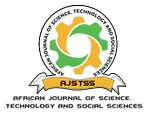Effects of camel feed supplementation on milk yields and composition during early pregnancy period
DOI:
https://doi.org/10.58506/ajstss.v1i1.28Keywords:
Supplementation, Lactation Curve, Yields, Milk Composition, Early Pregnancy, Tail CockingAbstract
A study was conducted between January and March 2022 which was the camel mating season at Ngaremara ward of Isiolo County. The objective was to determine the effect of feed supplementation on milk yield and composition in early pregnancy. It is documented that camels in pastoral environment drop milk production immediately after conception. There is limited information in literature on effects of supplementation on milk production at this stage. A complete randomized design was used to select ten camels which were supplemented with a formulated concentrate supplement made of locally available materials and ten un-supplemented which was the control. All camels were dewormed at the beginning of the study. Formulated feeds were gradually introduced to ten camels by adding 1 kg daily and enticing them with green acacia pods for 2 weeks until all supplemented were able to feed 3.5 kgs in the evening after grazing. Mating took place naturally using a bull between 6th January and 15th February 2022 and one supplemented and two un-supplemented camels were not mated. Milking was done in the mornings after allowing the calves to stimulate the teats for the milk letdown reflex. Production of milk in litres was recorded daily and total production per camel tabulated on weekly basis. Milk samples were taken every week and analyzed for protein and fat levels. Statistical data analysis for milk yields was done by comparing weekly means using ANOVA with the help of SPSS. Mean weekly milk yields per camel in litres for the supplemented and un-supplemented was 8.6067 ± 0.23691 and 8.0797±0.26185 respectively. There was a consistent increase in milk production for the supplemented camels with a significant increase of 1.63 litres at week 3 (P<0.05). The un-supplemented camels had a consistent drop of milk production which was more significant (P<0.05) at week 5 and 7. Supplemented camels milk had percentage increase in fat content of 3.470 ±0.0300 compared to 3.157±0.0228 for the un-supplemented. The supplemented camels were mated earlier than the un-supplemented. Six supplemented and five un-supplemented were confirmed pregnant through the indigenous knowledge method of cocking the tail (kutoa mkia) when the male or a person approaches. The study concludes that feed supplementation can positively affect the lactation curve and fertility in camels. It is recommended that camels be supplemented with feed formulations made from locally available materials at around the time of mating to improve production and reproduction. Further studies are recommended to determine the effect of pregnancy on milk yields and composition.


